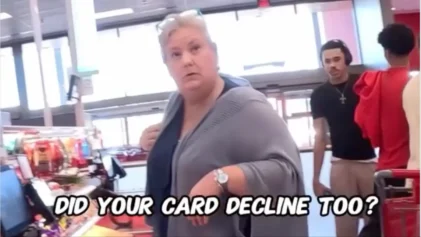Kiara Young was attempting to cash a $10,500 check at a local PNC Bank in Michigan when the bank refused to cash it without providing a valid explanation – leaving Young to assume it was because she was “Banking While Black.”
Especially considering the check was issued from a local car dealership that had an account with PNC Bank, meaning the name of the bank was on the check.

Young, who had just sold her car to the dealership, had tried to cash the check at her own bank but was told to cash it in PNC Bank since it was their check. If PNC Bank had reason to believe Young was committing fraud, they could have easily contacted the dealership to confirm the legitimacy of the check, which is standard protocol for banks.
Instead, the white bank manager who refused to cash the check “had an unprofessional tone, was rude, and gave Ms. Young an unfriendly look,” according to a lawsuit Young filed against the bank last year.
“The only investigation (the bank manager) engaged in was determining Ms.Young’s skin color and seeing the amount of the check to be cashed,” the lawsuit, obtained by Atlanta Black Star, states.
“Defendant’s failure to investigate the check before denying Ms. Young the service constituted a deviation from Defendant’s own policies or practices.”
In fact, Young was able to cash the check without any problem the following day at another PNC branch, which made the original bank’s refusal even more suspicious.
PNC Bank responded to the lawsuit by asking the judge to dismiss the case on the basis that it is “factually deficient” and “fails to plausibly state a claim of racial discrimination.”
But more than a year since she filed the lawsuit, PNC Bank has failed to provide a valid reason why Young was denied service in the first place other than claiming the bank was about to close and did not have enough cash on hand – details that were never explained to Young when she was denied service.
According to the judge’s decision:
Based on the allegations in the complaint, the Court has to make an inference about the bank manager’s true reason since it was unstated. It can infer that the bank denied service for a legitimate business reason, or it can infer that the bank teller discriminated against Young on the basis of race. Without more, they are both plausible inferences. Reading the complaint in the light most favorable to Young, she has sufficiently pleaded facts that could plausibly suggest racial animus as a motivation for denying service.
The Court finds the following alleged facts create a plausible claim: (1) the bank manager was not part of the protected class;3 (2) the bank manager was rude for no apparent reason; (3) the bank manager immediately stopped the teller from performing the transaction after the teller had explained the fee and Young had agreed to the fee; (4) the bank manager refused to state the reason for the denial of service; (5) the bank manager allegedly failed to follow PNC’s policies; and (6) the next day, Young was provided the same service at a similar time of day at a different PNC branch.
The Refusal of Service
Young, a 33-year-old accountant for the city of Detroit, sold her Cadillac CTX to the Lunghamer Buick GMC car dealership in Waterford on May 24, 2023, and was advised to cash the check at PNC Bank, which is where they had their account.
Young first attempted to cash it at her own bank but was told there would be a hold on the check, which could take up to a week since it was not their check. They also advised her to cash it at PNC Bank to receive the money that same day.
It was 4:50 p.m. on a Wednesday when Young entered the PNC Bank branch in Common Township, attempting to cash her check. The bank was scheduled to close at 6 p.m.
At first, a teller told her she would have to pay a 2 percent processing fee, which she agreed to do. But then other bank employees began examining the check, apparently becoming suspicious and calling the manager.
The manager then told her they would not be cashing her check without having bothered to conduct the routine investigation to determine the validity of the check. Instead, the manager told her to cash the check at her own bank.
“She took the check and said, ‘No, we are not going to cash this,’” Young said in an interview with the Detroit Free Press.
“I asked, ‘Why not?’ And she said, ‘We just can’t.’”
Young said she “felt embarrassed and humiliated” and ended up crying in the car. The following day, she was able to cash the check at another PNC branch in Troy without any issue or having to pay the two percent processing fee.
A Never-Ending Pattern
Earlier this year, another Detroit bank was sued by a Black couple for refusing to cash a settlement check on four separate occasions. And last year, another Black man filed a lawsuit against a bank in Minnesota who called the cops on him when he was trying to cash a cashier’s check.
In 2022, “Black Panther” director Ryan Coogler was handcuffed and detained after trying to withdraw $10,000 from his Bank of America account in Atlanta.
Coogler was reportedly wearing a cap, sunglasses and a mask and handed the teller a note, asking her to be discreet, but he also gave her his bank card, ID and PIN number, The New York Times reported.
The teller, who was also Black, told her manager that she didn’t feel comfortable about the transaction and feared Coogler had a gun.
“She got scared when a Black dude handed her a note,” Mr. Coogler said. “I don’t know what else to say.” He added, “If she was scared, she’s got to admit that.”
In 2021, another Black man ended up in handcuffs after trying to cash his $900 paycheck at a U.S. Bank branch in Minneapolis after he said the manager told him, “You people always coming in here with fake checks.”
Even Black attorneys are treated like criminals when attempting to cash checks, as John Pittman II learned in 2021 while attempting to cash a $12,000 settlement check at a Bank of America branch in San Diego.
“You would think that banks would learn by now to be more sensitive to this,” attorney Shereef Akeel told the Free Press, which is representing Young and has filed numerous “Banking While Black” lawsuits.
“We will keep filing these discrimination suits until it stops. It’s unfortunate that African Americans in the 21st century still have to face such difficulties when they want to obtain simple banking services like cashing a check.”


